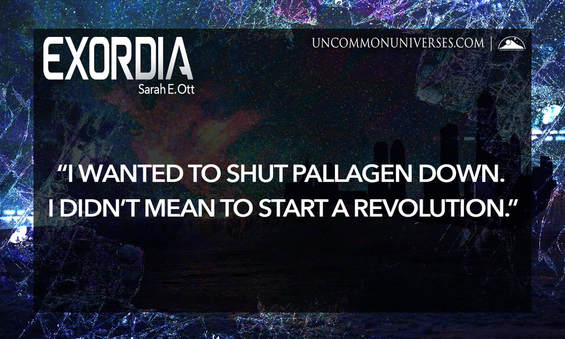|
0 Comments
 Amanda Sanchez is a 19-year old, Class Three citizen, who lives in the Polis, a thousand-year-old underground human colony. The Polis is thought to be the only surviving human society, the last remnant of The Destruction, a nuclear war spurred by religious factions. The Polis has survived and thrived only because it has been strict about enforcing a no-faith rule. Anyone found to hold faith is banished to the irradiated surface to die. Amanda has faith and her secret might just spell trouble, not just for her, but for her boyfriend and her best friend. But when Amanda stumbles into a dark truth about the Polis, she realizes that her city is not so perfect after all. Even worse, the Polis is running out of resources and may not make it another thousand years. To save her beloved city, Amanda's secret must be revealed, endangering the lives of everyone she loves. Pre-order here at Amazon.  Finally, The Clay Queen, Book 1 in The Children of Clay series, is ready for re-release. This revised story will provide the background hinted at and will provide deeper foundations for upcoming books in the series. E-Book available on Amazon Queen Nouei's past, present, and future selves are in conflict. They want to erase each other. But when Nouei's future and present self conspire to change their history, her past fights back. To save her human creation, Nouei must prevent the Almighty, Lord Rynae, from destroying the world and starting over again. But Nouei is not powerful enough to withstand Lord Rynae unless she can return to her past, rewrite her history, and make herself more powerful. But when Nouei attempts to recreate her past, she finds that Bridget, her past self, has a mind of her own. Bridget, instead, is consumed with love for Lord Rynae, the very god who wishes to annihilate Nouei. It's hard not to love Lord Rynae, but Nouei has found out the hard way that loving Rynae is a death sentence. If Bridget's devotion to Rynae continues, then Nouei's future will end. Nouei wants to live, Bridget wants to die. Two women, one history, who will prevail? So far in The Children of Clay series, I've released:
Books 4 and 5 are in the works. Titles and covers to be revealed later. Book 4 is complete, but needs editing. Book 5 is 70% complete and of course will need editing. I've completed another book in the universe which is going to need editing work also. After that, I anticipate three more books and the series would be complete. Book 4 was a real bear. I had to work hard to make it work. Why? I've had the entire story in my head for over 10 years and before I began publishing, I had what I thought was books 1-4 all set. These covered the 9,000 year history of the series, But as I set out to publish book one, I realized the backstory, which was in my head, needed to be told. That backstory became the trilogy out now, The Clay Queen, Clay to Ashes, and Icon of Clay. All three were initially just a long chapter in the originally conceived book 1. Then there was a transition chapter between what is now Icon of Clay and what was to be my book 1. That transition is the current Book 4 and it jumps ahead 20 years after Icon of Clay and sets up Book 5, which was the original book 1. Everything seemed good up until I began to revisit the original book 1 which is now book 5 and I realized that I needed to dig deeper foundations for this book to make sense. In the original conceived series, I had a short-story length prologue that set up Queen Nouei's ultimate dilemma and what triggered the series. But as I wrote The Clay Queen and even, She Died in my Arms, I avoided that story because I listened to people who thought that the post-Apocalyptic fantasy-esque vibe of that story (set 9,000 years in the future) did not fit the contemporary sci fi feel of The Clay Queen. Now I realize I have to tell that story which has percolated in my head for years. So what does this mean? I'm rewriting The Clay Queen. The story as is will remain but I am adding three elements. First, I've added the five days Jeremy and Bridget Blade spend in Paris on their disaster of a honeymoon to give us more about them. Second, I think I'm adding just a little more about the parallel world (Index 100) that the nun, Sister Kaypore hails from. And then, third, much, much more about the world in the future that Queen Nouei is from and how her situation triggered her reincarnation as Bridget. When it's all said and done, The Clay Queen will be triple its current length. Clay to Ashes (book 2) will expand but not by much. Icon of Clay (book 3) might get a smidgen or two of revision, but only if it's absolutely necesssary. Icon of Clay is complete as I conceive it. I don't have a timeline for when the revision will get done but I hope it'll be in the next 2-3 months for the revised The Clay Queen and Clay to Ashes. And then I'll resume releasing the other books and get the entire series out hopefully by the conclusion of 2019, God willing.  Sacrifices must be made. On a desert planet, all citizens must cooperate to survive. The scientific organization, Pallagen, protects the colony city of Exordia--whether they want it or not. Rebels must be broken. Ex-Pallagen researcher Lena Ward isn’t going down without a fight. Her team of Exordia rejects is ready to pierce Pallagen’s benevolent exterior and expose the truth of their horrible agenda. Loyalty must be programmed. Amnesiac Alex Kleric is reclaiming her life as an Enforcer dedicated to Exordia and Pallagen. But the records aren’t jogging her memories. Something is wrong--and all questions point to Lena Ward and her underground rebellion. Progress must continue. To save Exordia. At any cost. Available on: Amazon B&N iBooks Kobo Goodreads Uncommon Universes  Author Bio: Sarah E. Ott lives and breathes stories that involve high stakes and character-driven plots. When she’s not chasing plot bunnies or emoting over good literature, she can be found doing one of the following things: a) working as a kids ministry office administrator, b) driving her Prius to Dunkin’ Donuts, or c) curled up on a couch with a book and covered in live cats. Website: http://www.saraheott.com/ Twitter: https://twitter.com/Ott2Write Instagram:https://www.instagram.com/sarahlizzieo/ Facebook Launch Party: https://www.facebook.com/events/343546106139971/ Mad Max: Fury Road and Apocalypto are two awesome movies. Strangely connected by Mel Gibson. He was the original Mad Max and then he directed Apocalypto. One great feature of both movies is the idea of chase, and flight. In both cases, just about half the movie is chasing/fleeing at high speed. In Apocalypto, the chase is on foot through a jungle, in Mad Max it is with vehicles through a post-apocalyptic wilderness. Both feature religion in fascinating ways. In Apocalypto you get the full force of the Inca religion and then it runs smack into Catholicism, literally. There's a great scene at the end. Here it is. (Stop at the 1:35 mark or go on to the end) In Mad Max, they mix in different religious elements including, Valhalla, the Nordic after life. When the War Boys are about to die, they call out to the others, "Witness Me," and then then go out in a blaze of glory. We get the first taste of this in this following scene. In the film, one of the War Boys is captured by Furiosa and Max who are fleeing their captors. Nux is spared and he joins them and one of the women with him takes to him. The plan is, along with the few others with them, to destroy the sole path through a natural stone arch and return the community and run it differently. But of course, things go wrong and it is clear that Nux is going to die. And so in that moment, in an absolutely fantastic scene, he calls out to the others to witness him. When we think of death, there are two poles. On the one hand, we die alone. No one dies or can die with you or for you. That is the stark reality. On the other hand, we want people to share that death. But only if they want to. So only in a moment, when you are witnessed in death, is the cycle complete in a sense. Just as we're never born alone, when your death is witnessed, you don't die alone.
 The series prequel for The Children of Clay series is out now. Available on all platforms. In a post-apocalyptic world, 4,000 years from the present, Captain Senaya is the first of the Jaru forces to arrive at the far northern temple of the imposter deity, Queen Nouei. The Queen’s forces have been soundly defeated and she is now vulnerable. Senaya’s sole task is to secure a weak and defenseless queen until reinforcements arrive. But Senaya wants more. She wants to be the one who forces the queen to recant her false claims to divinity. Senaya is a seasoned warrior and this is her moment of glory. She has everything all planned, that is, until she meets the queen. Available on Amazon  I'm happy to announce the release of Choose Your Doom: Collected Short Stories (Picking Sides for the Apocalypse) This is a collection of short stories within the broad post-apocalyptic genre. There are AI stories, demon stories, virus outbreak stories, etc. My contribution is called "The Woman and Her Wasps." It is set in The Children of Clay universe, but is set in a parallel world. It does have events that impact The Clay Queen. I hope you enjoy it. It's available at: Amazon Kobo Apple Barnes & Nobles  I just completed Sara Gruen's At the Water's Edge. Actually, I listened to the audiobook, which was performed masterfully. I was very impressed with the story and the storytelling. The book has over 1,000 reviews and an average of 4 stars on Amazon. WTF! This is a 5 star book. But maybe I'm easily impressed. Spoilers. At Water's Edge is about a young woman, Maddie, who's life is among the wealthy socialites in the 1940s Philly high society. Her husband Ellis and his friend Hank, both declared medically unfit for military service, go to Scotland to try to capture footage of the Loch Ness monster. The trip to Scotland reveals their marriage for what it is as it unravels. In the meantime, she falls in love with Angus Grant, the landlord of the inn they're staying in. There is a happy ending so as you can imagine, lovebirds get together and the situation works out. I'm interested in notions of romance in literature versus real life, so I was thinking about the romantic interest in this book. He is introduced as a commoner, bearded gruffy man, who runs the inn. We come to discover a few things about him. He is considerate. He's an expert hunter who supplements the diet of the needy in town with secret gifts of game, i.e., people wake up to find fresh meat on their doorstep and they know it's him. He was an elite military soldier who was gutted in combat but killed his assailant with his helmet while his intestines were hanging out. He was a loving husband whose wife gave birth to their stillborn daughter and in distress on hearing that Angus was missing, drowned herself in the Loch. He is super strong, fearless, but super gentle and kind. And then a big reveal is that even though he lives like a commoner, it turns out tht he's a lord or something like that and the "big house"/estate in town is his by inheritance. In short, this guy is a dream. Now, I was curious about the other men in the story and began to think about them. In a romance story, where the girl gets the perfect guy, how are the other males presented? I don't read romance books often so I don't know. But in this case it was clear that no one, not even one male could be written in a way that threatened the main love interest.
Absent of love triangle issues, is this normal? That other male characters serve as foils to highlight the glories of the lead male? But in this case, few, if any of the males, had any redeeming qualities. It certainly makes for a great read because you are rooting for Maddie big time.  Love my mindless movies, so this was up my alley. Spoiler alert! The first Guardians of the Galaxy was something I watched when I had downtime and just wanted to see stuff blow up. But I was pleasantly surprised. It had a good story, good acting, very good humor, and of course, the 70-80s nostalgia. To be honest, I wasn't seeing how they could replicate the uniqueness of the first movie now that the cat was out of the bag. So what did I think of this second installment? I enjoyed it. The humor was there. The characters were great (baby root deserves an Oscar). The storyline was decent, if a little weak. But by far, the most poignant aspect of the film were all the family dynamics. So let's list 'em
The plot was that Star-Lord's Father, Ego, finds him. Ego is a celestial, i.e., god/immortal being. Turns out that the reunion is not quite what it seems, as Ego wants to turn Star-Lord into a co-domineering force and re-image the universe. So now the Guardians have to fight the god and work out all the family issues at the same time. The dynamic and intensity that carried the movie was between Gamora and Nebula. All the bad guys in the movie are comical to some degree except for Nebula. She carries real malevolence that you can feel. You don't want to run into her in an alley. She has hatred toward her father Thanos and holds her sister, Gamora, responsible for all Thanos did to her. And all through the film, you're waiting for this dynamic to play out. The other satisfying relationship was that of Yondou and Peter Quill. Here we find that the bad guy sacrificed a life of honor to save Peter. Even though he'd presented his actions as done out of purely selfish motives. As a smuggler, he realizes that Ego means to kill Peter and he thus never delivers him. At the end he gets his redemption and Peter gets to reconcile with, not just with his mentor, but his true "dad." As a creator of content, I found the film fascinating in that, they had a thin storyline, but they exploited the humor and relationship tensions to great effect and that was enough to make it a fun watch. This film was an aggregate of all the correct buttons. It's amazing to see the application of a formula and watch it work. Humans are predictable. If you find the right formula, you'll get a predictable response from us. |
AuthorOno Ekeh Archives
June 2020
Categories
All
|

 RSS Feed
RSS Feed

